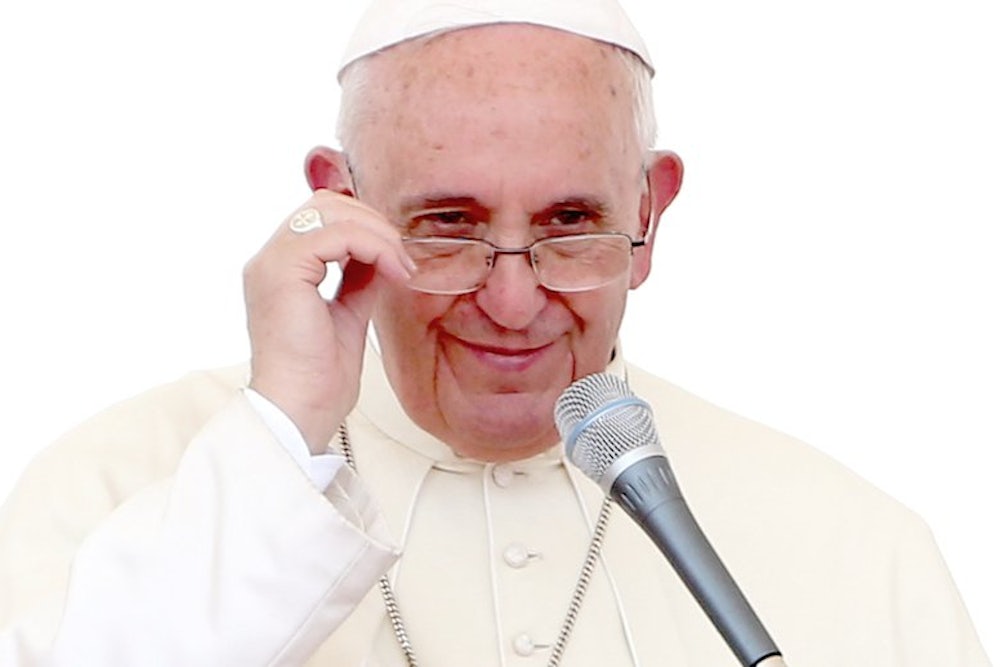The leaked draft of Pope Francis’s long-awaited environmental encyclical, according to veteran Vatican correspondent John L. Allen, “sent reporters into a tizzy, trying to discern what their ethical obligations are in such a situation.” Allen himself spelled out his reasons for reporting on the draft, despite the official embargo on the encyclical until Thursday. The Jesuit-run magazine America (for which I am a columnist) has decided that respecting the embargo means that it will delay commenting on the document until the final version appears. I’ve done the same—partly out of piety, and partly because ignoring the leak makes my life less complicated.
Though the leak appears to have been engineered by Francis’s critics, it has only heightened his spectacle. Maybe next time there’s an encyclical, the Vatican should engineer a leak of its own. This is a document with world-historical potential; encyclicals can affect the lives of a billion Catholics, and those of non-Catholics, too. Yet they’re usually written by committee, behind closed doors. Perhaps the Vatican should open the doors a little.
Perhaps it should learn some lessons from open-source software.
The Vatican and the open-source movement have more in common than one might realize. It was recently reported, for instance, that the Vatican Library relies on open file formats to keep its archives safe and accessible. A 2014 law journal article by Italian open-source advocate Marco Fioretti argued that there are natural affinities between Catholic social teaching and open-source culture. Concepts dear to the church, like accessibility for the poor and the primacy of the common good, are manifest in open source.
“While Openness is good in and by itself,” Fioretti wrote, “Catholics have even more reasons than others to promote, teach, and use it.”
Pope John Paul II wrote in his encyclical Laborem Exercens, “The right to private property is subordinated to the right to common use.” Just as the churches of Rome are free for visitors, information that affects us is our natural inheritance. This is the same logic that makes protecting the environment so important in Catholic tradition; creation is a God-given commons, and dividing it up into property is only valid so long as the owners remain good stewards.
Pope Francis has already made moves toward openness. In the Synod on the Family meeting last fall, draft documents were made public, and the final document included its own revision history. Daily press briefings turned the Synod into a global media debate. And well before the meeting, he sent bishops a 39-question survey to encourage them to consult with their flocks; some did so more than others.
Before becoming Pope Francis, Jorge Bergoglio was part of efforts to develop a Latin American “theology of the people,” rejecting what he viewed as elite intellectual projects from both the political right and left. “The activity of the Church should not only be oriented toward the people but also primarily derive from the people,” said the Declaration of San Miguel, a 1969 document by Argentine church leaders that Bergoglio associated with. As archbishop of Buenos Aires, he made a habit of visiting the slums each week to prevent his outlook from becoming corrupted by his position. Just as the 19th-century English cardinal John Henry Newman argued in his essay On Consulting the Faithful in Matters of Doctrine, Bergoglio believed that ordinary believers provide a necessary corrective to the whims of the theological elite.
Taking a lesson from the open-source movement wouldn’t mean turning church doctrine into a free-for-all. There’s still hierarchy in open source, and there’s still process. Certain people decide, based on experience and authority, which code submissions to approve or reject.
A draft encyclical, for instance, could be published and shared, inviting feedback—perhaps from anyone, or perhaps just through local church communities around the world. Readers could correct factual or doctrinal errors, or share their experiences and ideas. In every diocese, Wikipedian-like volunteers could cull the recommendations and summarize them—and their summaries, in turn, could be summarized in Rome. The responses at every level might remain available online, but the finishing touches on the final document would be the job of the proper authorities, including the Pope.
This gives a new meaning to the word “encyclical”; it would be not just a circular letter from the Holy Father, but the result of a shared effort by the church as a whole. The church would more truly be speaking “from the people.” This would require participation, of course, and it might make some of our lives a little more complicated—in a good way. Leaks can be a feature, not a bug.
